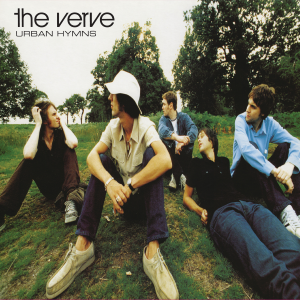Urban Hymns (lost original Rockfield Studios sessions of The Verve album; 1996)
The English rock band the Verve's third studio album Urban Hymns is their most well known and successful album to date. Released on 29 September 1997, it has sold 3,340,000 copies in the UK as of October 2018, making it the 19th best selling album of all time in the country. Besides featuring their best known song, "Bitter Sweet Symphony", it also features the UK chart topper "The Drugs Don't Work," "Lucky Man" and "Sonnet". However, the making of the album itself and what came before it is another story, one full of strained relations amongst band members, madmen producers, and an entire recording of the album being scrapped.
History
The original sessions for Urban Hymns were produced at Rockfield Studios in Wales by producer Owen Morris, who is best known for producing the second and third studio albums by Oasis. Morris had previously collaborated with the band for their 1995 album A Northern Soul, although these sessions were a nightmare for everyone involved. While everything was said to be "smooth-sailing" for the first three weeks, after that it devolved into chaos due to the heavy drug taking.
In Trevor Barker's book on frontman Richard Ashcroft, the band's manager at the time, John Best, described how the sessions appeared to him. He mentions events such as how Morris once stood up on the producing desk with a tonic and vodka in his hand, and chucked it across the room into the studio's glass. "That was a grand and a half's worth of glass we had to pay for." It's also said that the band would "work on different clocks"; with the exception of guitarist Nick McCabe, the band would wake up at 2 p.m, and begin work after dinner at around 6 p.m., lasting until 6 a.m. McCabe, being a father, worked from 10 a.m to 10 p.m.
McCabe began to distance himself from the band as he could not stand any of the insanity that occurred. McCabe would also refuse to play on the song "History," given it was demoed without him knowing, which led to him believing that the band would rather work with themselves rather then with him included.
It would all come to ahead on 6 August 1995, after they preformed at T in the Park '95. After the gig, McCabe mentioned that he did not think it was a good show, which was the straw that broke the camel's back, with Ashcroft deciding that would be the last Verve show. He also would kick drummer Peter Salisbury's cymbals around back-stage, indicating he had a falling-out with Salisbury.
A few weeks later, on 18 September, the band's final single (and final single from A Northern Soul) was released - "History", with the front cover of CD1 showing a sign in Times Square that read "all farewells should be sudden."[1] Despite this, it was purely a coincidence, as sleeve designer Brian Cannon would mention that sign was already there by the time they took the photo.[2]
However, it later became apparent that the Verve were not over, rather they would continue without McCabe. After looking for replacements, they landed with Simon Tong, a school friend credited with originally teaching Ashcroft and bassist Simon Jones to play guitar. Many of the songs for this project were first introduced on 13 March 1996, when Ashcroft opened for Oasis at a gig in New York. Reception to these songs were positive, and it encouraged Ashcroft to move further. The band eventually headed to Rockfield Studios in Wales, and despite the trouble from the previous album's sessions, they would once again work with Owen Morris to produce the album. It is said that these sessions were much smoother then those of A Northern Soul, and by December 1996 they had made a complete version of Urban Hymns with Morris. However, Ashcroft realized how important McCabe was to the sound of the Verve, and on New Year's Day 1997 phoned McCabe and invited him back to the band, which McCabe accepted.
Due to Morris being involved, McCabe did not want to work on the sessions, likely out of fear what happened a few years earlier would repeat. This would lead to all of the sessions being scrapped, with the album being rerecorded with Chris Potter as producer at Olympic Studios in London, which would be the final sessions for the album. Tong would remain part of the band during this process, making Urban Hymns the only album the Verve recorded as a five-piece.
Availability
None of the original sessions have been preserved or archived, rendering them lost, with only accounts of the sessions being the only thing proving their existence.
